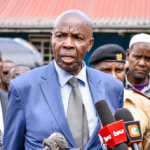The U.N. General Assembly approved five new members on Thursday for two-year terms on the organization’s powerful 15-nation Security Council in a lackluster “election.” Denmark, Greece, Pakistan, Panama, and Somalia will start their terms on January 1, 2025.
This annual election is often little more than a rubber stamp of candidates previously agreed upon within regional blocs. This year, all five candidates ran unchallenged in what is known as a “clean slate,” but they still needed to secure a two-thirds majority of votes to succeed, which they easily did.
While the permanent five members — Britain, China, France, Russia, and the United States — wield veto power, the 10 elected members help balance the council. In recent years, these elected members have increasingly banded together to use their collective influence.
“At the moment, there’s a lot of pressure on the elected members to keep the body working in a period when the permanent members are fiercely divided and often at each other’s throats,” Richard Gowan, U.N. director for the International Crisis Group and a long-time U.N. watcher, told VOA ahead of the vote.
Geopolitical divisions between Russia and China on one hand, and the United States, Britain, and France on the other, have deepened since Russia’s illegal invasion of Ukraine in February 2022. Moscow, Beijing, and Washington have repeatedly vetoed each other’s draft resolutions in the council or introduced competing ones on the same issues, which has undermined the council’s ability to take effective action to mitigate conflicts in Ukraine, Syria, and Gaza.
“It’s very tough to be an elected member, because you are trapped between the U.S., Russia and China,” Gowan noted.
“The big powers are willing to put a lot of pressure on the smaller countries when they want to.”
Of the incoming group of five, Gowan says expectations are especially high for Denmark.
“The Nordic countries have a long history of effective and skillful U.N. diplomacy,” he said, noting that Norway played an important role during its council tenure in 2022 in advancing humanitarian assistance for Afghanistan while the P5 were clashing over Ukraine.
“I think there’s an expectation that Denmark is going to take on a lot of responsibilities, a lot of difficult files, and there’s an assumption that just as a Scandinavian nation, it knows how to make the Security Council work,” he said.
Greece’s foreign minister said they hope to be a facilitator between nations.
“We aspire to provide bridges between South and North, East and West,” Giorgos Gerapetritis told reporters.
It is rare for a country to have both a U.N. political assistance mission and an African Union mission with troops and police within its borders while serving on the council. Somalia, which has been combating al-Shabab militants—whom the United Nations identifies as a serious threat—continues to work on rebuilding its government institutions after a decades-long civil war.
As a regular item on the council’s agenda, Somalia’s foreign minister has sought to characterize their recent history and experience as an asset to the council.
“We are fully prepared to bring our distinct perspectives, experiences and solutions to the global arena, making a meaningful contribution to the work of the U.N. Security Council in the maintenance of international peace and security,” Ahmed Moallin Fiqi told reporters after the election.
Panama’s foreign minister said she appreciated the international community’s faith in her country, especially at a fraught time in the world.
“It’s a great challenge, especially in the face of the critical geopolitical moments we are living, in which this challenge is not only the survival of the constituted world order, but also the survival of the inhabitants of the planet,” said Janaina Tewaney
Panama, which has experienced significant droughts affecting the Panama Canal, has stated that addressing the impact of climate change on peace and security will be one of its priorities on the council. The 15 nations on the Security Council have the authority to maintain international peace and security by authorizing the use of force, deploying peacekeeping missions, and imposing sanctions.
On January 1, the five new members—Denmark, Greece, Pakistan, Panama, and Somalia—will replace Ecuador, Japan, Malta, Mozambique, and Switzerland, whose terms end on December 31. They will join current nonpermanent members Algeria, Guyana, Sierra Leone, Slovenia, and South Korea, who will remain on the council through 2025, alongside the permanent members.
Later on Thursday, the General Assembly is set to reconvene to approve Cameroon’s former prime minister, Philemon Yang, as president of the 79th session of the General Assembly. This session will begin on September 10, 2024, and run for one year.



